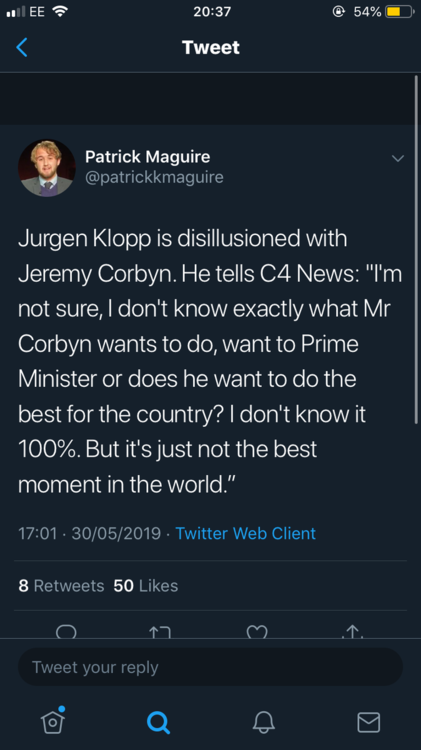On the first two bolded sections: If you have a gander at the polling from the time, the SDP split happened at a time when Labour were dominant in the polls. The split didn't occur because Labour's shift to the left was harming it's electoral prospects. Quite the opposite, it happened because the shift to the left hadn't harmed the party's prospects and it was looking increasingly like the left of the party would win the next election. As Cheesy points out, whether you agree with the idea that the Falklands saved Thatcher or not, the polling bears it out; had there been an election on the eve of the Falklands War, a far more left wing Labour than the current one would likely have won it. Thatcher was incredibly unpopular during her first term because her economic policies simply left the majority of people worse off than they had been in 1979. You can talk about reducing inflation, but to trumpet it as a triumph in and of itself shows an ignorance of how economics affects the real world. Her dogmatic adherence to the free market and obsession with smashing unions counteracted any benefits lower inflation might have yielded for the man on the street; all reducing inflation achieved in practice was to make British exports uneconomic and force hundreds to factories to close. Her unwillingness to intervene to support industry (partially out of adherence to laissez-faire economics and partially because letting big factories fail would hurt the unions) caused record unemployment which lasted well into the mid-80s and drove hundreds of thousands into poverty. Before the war she had some of the lowest approval ratings of any PM in history, afterwards she had some of the highest.
You could write a whole book on the 3rd bolded section. Media plays a huge part, most outlets have enormous right-wing bias and a lot of people don't have a head for politics or the time/inclination to do independent research into what they read. Jingoism remains an enormous factor in British politics, in 2019 it's still political suicide to be anything but obsequious to the armed forces, the monarchy etc. or to attempt to deviate from the idea that Britain is always the goodie and the other guy is always the baddie. The British left's biggest problem electorally is that it has little appetite for blind patriotism. The fractious nature of the British left, it's split in tendencies between partisan alignment and factionalism, gerrymandering, low voter turnout amongst the poor, FPTP, the domination of politics, journalism and business by the upper middle classes and dozens of other factors all tie in. Regardless, polling consistently shows that the public are generally to the left economically of the politicians they elect. Hell, polling from the 2000s demonstrated that if people voted purely on the basis of the policies they supported, the Green Party would get the most votes.
Just briefly on the last bolded point; we don't need them both occupying the centre/left space so it's handy that they don't. In terms of their policy commitments Corbyn's Labour occupy the centre-left. The PLP spans from a left to centre-right, the Tory Party spans centre-right through to hard-right and the Lib Dems float hither and yon without letting their feet touch the floor long enough for them to actually grow some ideological roots; they don't have many convictions or ideas and they don't seem to really believe in the ones they have.
Anyway, I feel like you're missing both of my points there. The first is that if you actually look at it, the policy platform of Corbyn's Labour isn't particularly left-wing. Take nationalisation/privatisation as an example: nationalising everything would be the ultra-left position and privatising everything would be the ultra-right position. Current Labour policy is to nationalise key infrastructure and utilities and leave everything else privatised, which is basically the definition of middle-ground. It's undoubtedly a more centrist position than the current state of affairs where almost every utility is privatised, huge swathes of our infrastructure is privatised, private companies run our transport infrastructure (badly) and government departments and the NHS routinely contract the private sector to provide front-line services (again, badly). Across the board, current Labour policy is dipping its toes into Social Democracy, not paddling into Socialism or diving into Communism (which is how many in the Tory Party and the right-wing media would have it).
The second point is that again, when you actually look at it, the policy platform of Corbyn's Labour bears very little resemblance to the "old school Socialism" you mentioned in the post I was responding to. For example if we take nationalisation again, the 2017 manifesto and the surrounding policy documents specifically reject the big-state model of nationalisation which characterised the party in the 1960s and 1970s. It's just a lazy comparison, and one seemingly based solely on the fact that the people involved all identify themselves as 'socialists' rather than on looking at the actual policies.
Nah, plenty of people got barred on the grounds that they'd tweeted/posted on facebook in support of the Greens prior to joining Labour. One person got barred from the voting for tweeting in support of the Foo Fighters ffs.




